skip to main |
skip to sidebar
The town council paid a contractor by cheque but when he presented it to a branch of Lloyds Bank in England, it was refused.The contractor got in touch with the town council and said: “I apologise for having to contact you about this as I find the whole situation embarrassing.“Earlier today we received a cheque from Cardigan Town Council and similar to last time, the area where you write the amount is written in Welsh.
“I previously attempted to pay your cheque into our local Lloyds branch and it was refused. Today, I attempted to take alternative action and contacted the business section of the bank before it was paid in and again I was informed that the cheque would be returned back to me.
“I even tried to contact Lloyds Bank, Cardigan to speak with them and although I was guaranteed that a call would be returned in three hours, they have still not been in touch.”
Eventually, the cheque was honoured but not before a stinging response from Cardigan town clerk Wynford Jones.
The choice of words was made on the advice of the Bunscoill Ghaelgagh and others, with children and non-Manx-speaking adults in mind.
The idea of the book came from Vicky Webb, who has illustrated the book in images reminiscent of Eric Carle’s ’The Hungry Caterpillar.’
Having given birth to her daughter, Evelyn, earlier in the year, Vicky wanted something ’true to the Isle of Man’ to read with her. She said: ’I wanted something that would help Evelyn grow up with a sense of place in her life, of living in the Isle of Man, which is a special place unlike anywhere else in the world. Language is a key part of that.’
Although only an early learner of the language, Vicky feels that the Manx language was an important part of the Isle of Man and being Manx. The book comes with a full pronunciation guide and translation for all the terms.
James Franklin, online and educational resources officer at Culture Vannin, said: ’The island’s language has an enormously positive attraction to visitors to the Isle of Man and to so many of us who live here. We hope that this book will give people a way to bring the language into their everyday lives.’ The book is priced at £5. It is available from a number of shops including from Culture Vannin’s own shop in St John’s.
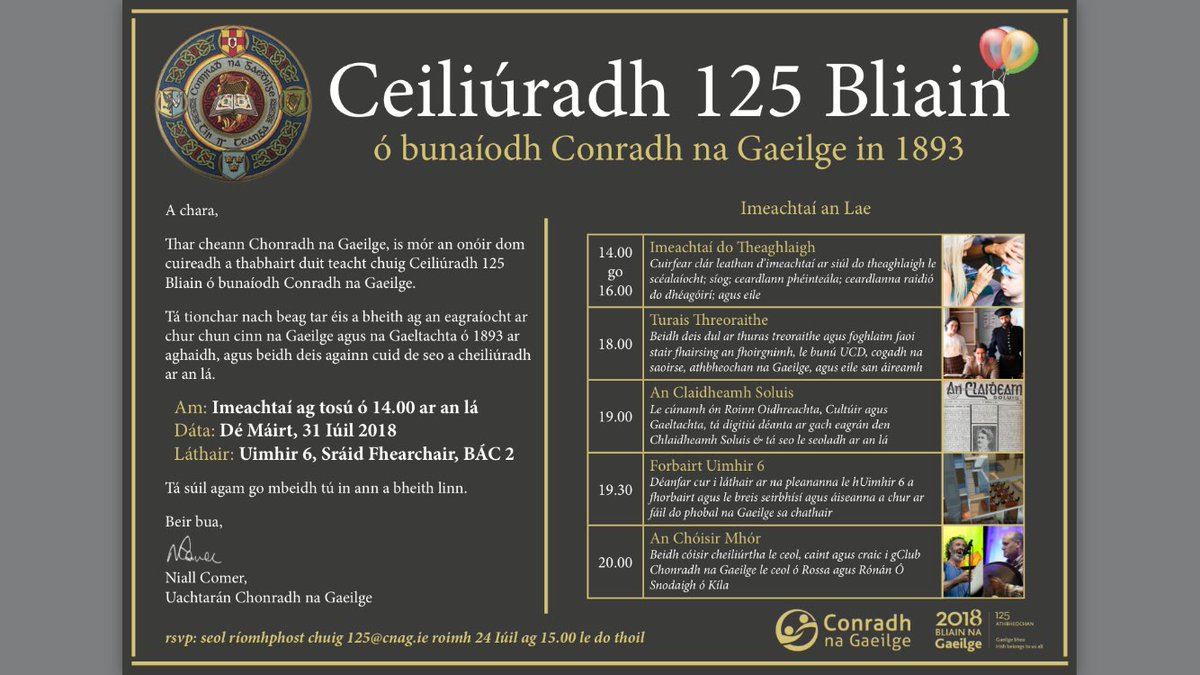
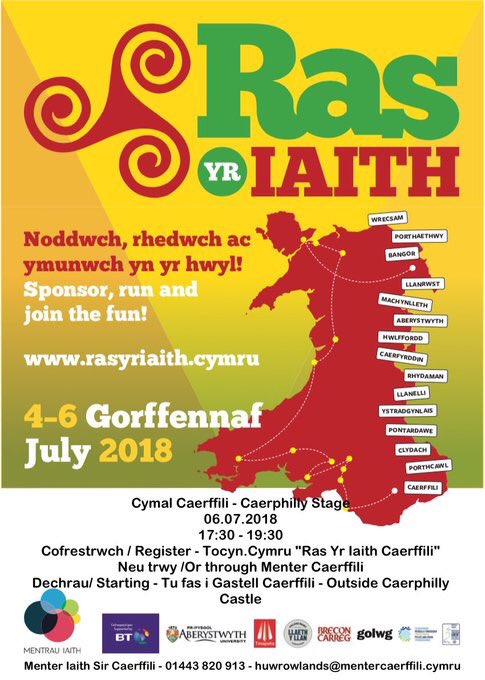
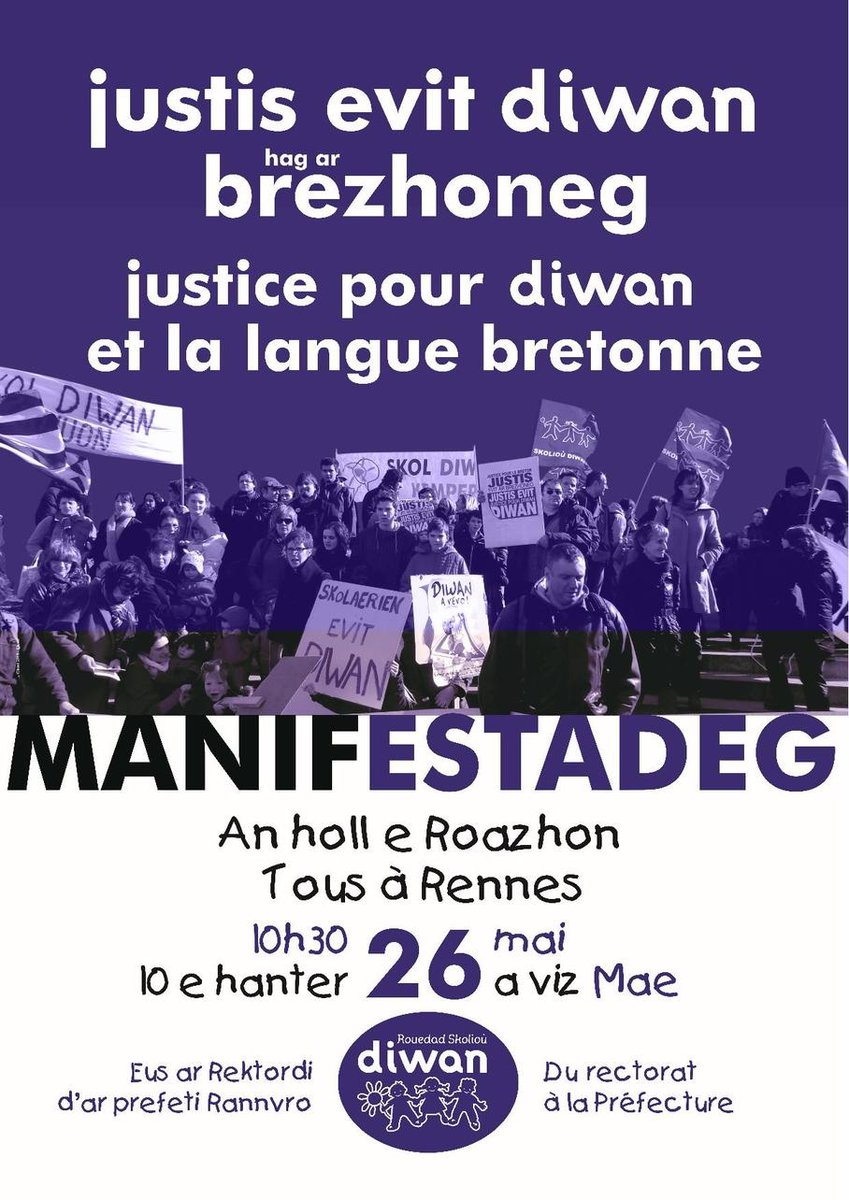
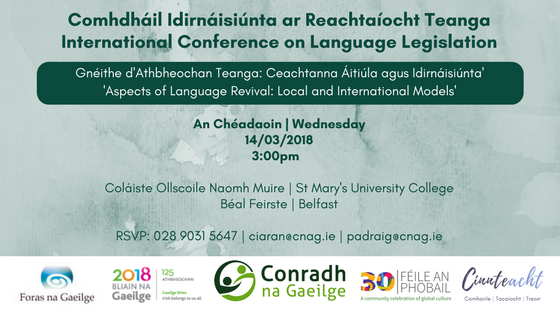
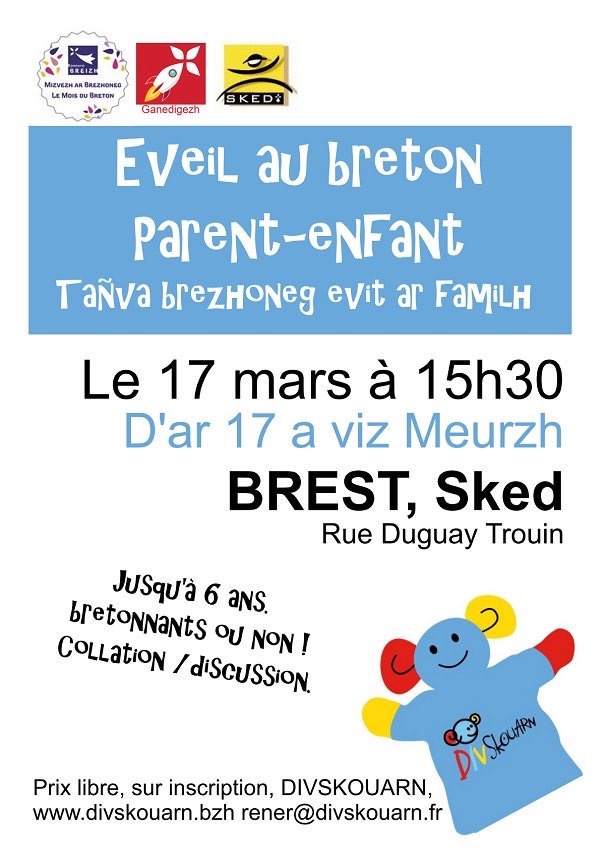
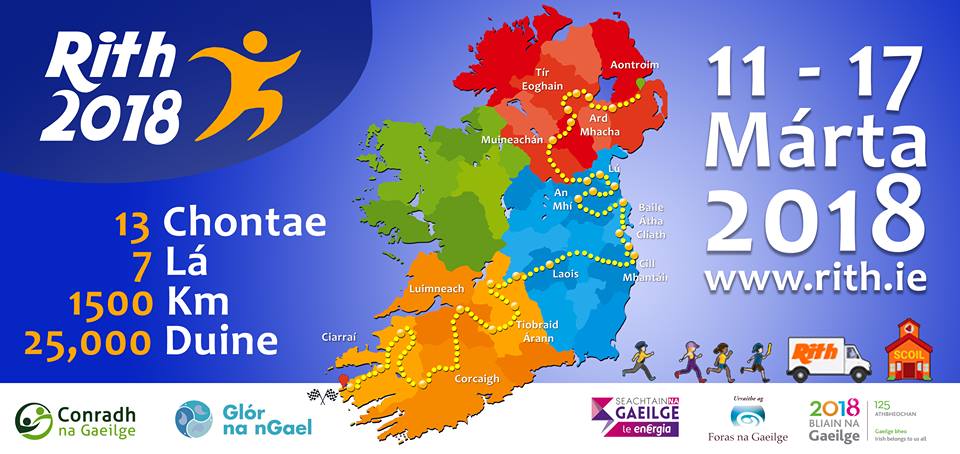



Celtic Languages News
Most Read
-
Last year, they were 15. This year, they are 14 candidates for the baccalaureate of Diwan high school in Carhaix, Finistere, to have wr...
-
The first ever television chat show in the Cornish language has been launched. Two pilot episodes of 'Jaqi ha Jerry' have been made...
-
Stumdi organized an employment forum in Breton language (Forom an implic e brezhoneg) on Wednesday, March 21st, 2018 at the Le Family cult...
-
Children are getting their first taste of the Manx language with a new book. ’ A Manx Alphabet’ is designed to engage young children look...
-
The first female MSP to make a plenary address in the Scottish Parliament chamber in Gaelic has warned the language’s future will only ...
-
We have available each of the Celtic flags in 60 x 90 size as well as other sizes. Please write to: nsestat@gmail.com Ireland/Eire ...
-
Deputy First Minister, John Swinney MSP officially opened Bun-sgoil Ghàidhlig Phort Rìgh in September. Support given to Highland Council by ...
-
45 schools in Galway are to benefit from almost 1.5 million euro in funding under the Irish Language Assistants Scheme. The new funding com...
-
Young Gaelic speakers have a duty to pass on the language to the next generation, according to SNP MSP Kate Forbes. Ms Forbes made the c...
-
Steph Norman and Aaron Willoughby have been told they must have their wedding ceremony in English first. Steph Norman and Aaron Willoughb...
Arxive
-
▼
2019
(106)
-
▼
01
(19)
- Ceredigion's plan to increase the number of childr...
- Children get a taste of the Manx language
- Scottish Gaelic language plan launched by Scottish...
- Irish Still Under Threat in Twenty-Six County Educ...
- Mannin: Ned Maddrell lecture on the Irish experien...
- KEAV General Assembly held with a strong success
- Donegal Council blasted over its policies towards ...
- Béal Feirste / Belfast City Hall lit in red for Ir...
- Simultaneous protests in several stations demand t...
- Assembly of the association Kafe Brezhoneg fully i...
- Cardigan Town Council cheque rejected by Lloyds Ba...
- Edinburgh Gaelic Week for Schools 2019
- Fears raised over Welsh language education funding...
- The key figure in the revival of the Manx language...
- Lisvane primary school makes Welsh language fun to...
- Arts Council England and Cornwall Council launch C...
- Welsh 'Foreign' HSBC Tell Customer
- Scots urged to safeguard Gaelic for future generat...
- Welsh Language Weekend by Cymdeithas yr Iaith Gymraeg
-
▼
01
(19)
2019/01/28
Scots urged to safeguard Gaelic for future generations
Young Gaelic speakers have a duty to pass on the language to the next generation, according to SNP MSP Kate Forbes. Ms
Forbes made the comments ahead of delivering the first annual address
in memory of John Macleod, the former president of An Comunn Gaidhealach
– the Highland Association.
She will deliver her lecture in Gaelic at the University of Edinburgh later on Thursday.
The organisation was set up in 1891 to help support and promote the Scottish Gaelic language, culture and history at local, national and international level.
It is also organises the Royal National Mod.
Mr Macleod died in early 2018, having worked to encourage young people in the Gaelic community throughout his life.
She will deliver her lecture in Gaelic at the University of Edinburgh later on Thursday.
The organisation was set up in 1891 to help support and promote the Scottish Gaelic language, culture and history at local, national and international level.
It is also organises the Royal National Mod.
Mr Macleod died in early 2018, having worked to encourage young people in the Gaelic community throughout his life.
Ms Forbes, who worked with Mr Macleod while convener of the
cross-party group on Gaelic, said she was honoured to deliver the
address, paying tribute to the late An Comunn Gaidhealach president.
“He was a man who recognised his responsibility to safeguard and invest in the language,” she said.
“Most critically, he saw that the next generation needed to pick up the baton.”
She added: “The title of the address captures the sense that as we have inherited a great heritage, we have an even greater responsibility to pass it on.
“I will be discussing the role of young people in taking the language beyond the school gates and into their daily lives.
“We have seen a beautiful musical and cultural revival in Scotland – and it seems fitting that the lecture should fall during Celtic Connections – but we want that to include the language.”
“He was a man who recognised his responsibility to safeguard and invest in the language,” she said.
“Most critically, he saw that the next generation needed to pick up the baton.”
She added: “The title of the address captures the sense that as we have inherited a great heritage, we have an even greater responsibility to pass it on.
“I will be discussing the role of young people in taking the language beyond the school gates and into their daily lives.
“We have seen a beautiful musical and cultural revival in Scotland – and it seems fitting that the lecture should fall during Celtic Connections – but we want that to include the language.”
2019/01/26
Welsh 'Foreign' HSBC Tell Customer
“A major bank told a customer who wrote to it in Welsh to complain
that some services were not available in her language that she should
communicate with it in English rather than a “foreign” tongue. Nia Lloyd, a classroom assistant from Wrexham in north Wales, wrote to
HSBC pointing out that online services were not available in Welsh.
Customer support replied that her message was in a “foreign” language and asked her to resend it in English. Both Welsh and English are official languages in Wales.
Lloyd said: “I was shocked that they would respond to my complaint in that way. I thought the bank would have more respect for the Welsh language. They should celebrate all the beautiful cultures and languages of the world.”
The Welsh-language campaign group Cymdeithas yr Iaith criticised the bank’s reply. A spokesperson for the group, Tamsin Davies, said: “These comments are insulting, but unfortunately not unexpected; after all, banks are disrespecting Welsh speakers every day. There isn’t a single bank that provides online banking in Welsh.”
Full report here at ‘The Guardian’.
Customer support replied that her message was in a “foreign” language and asked her to resend it in English. Both Welsh and English are official languages in Wales.
Lloyd said: “I was shocked that they would respond to my complaint in that way. I thought the bank would have more respect for the Welsh language. They should celebrate all the beautiful cultures and languages of the world.”
The Welsh-language campaign group Cymdeithas yr Iaith criticised the bank’s reply. A spokesperson for the group, Tamsin Davies, said: “These comments are insulting, but unfortunately not unexpected; after all, banks are disrespecting Welsh speakers every day. There isn’t a single bank that provides online banking in Welsh.”
Full report here at ‘The Guardian’.
2019/01/22
Arts Council England and Cornwall Council launch Cornish language show
The first ever television chat show in the Cornish language has been launched. Two pilot episodes of 'Jaqi ha Jerry' have been made with money from FEAST - a programme funded by Arts Council England and Cornwall Council, and managed by Creative Kernow. The
programme, hosted by Jerry Sethir and Jaqi Heard, is a half-hour show
on the online Cornish language TV channel 'Pellwolok an Gernewegva'.
2019/01/21
Lisvane primary school makes Welsh language fun to learn
Welsh will no longer be classed as a second language in English-medium schools, under new proposals. All pupils will follow the same curriculum for the language from 2022, but English-medium pupils will not necessarily be expected to meet the same standard as Welsh-medium students. Other reforms include introducing "international" languages in primaries. The Welsh Government said it was working to ensure teachers had the right skills. Llysfaen Primary School in Cardiff is not a Welsh-medium school - but pupils are already learning more of the language through its Criw Cymraeg programme. Finley, 10, and Naina, 11, act as mentors to help others - while Welsh is being used in conversation in lessons, like maths and science.
2019/01/20
The key figure in the revival of the Manx language, Dr Brian Stowell dies, aged 82
The key figure in the revival of the Manx language has died at the age of 82, following a long illness.
Dr Brian Stowell spent his life devoted to academia, as a physicist as well as a linguist.
Learning Manx as a student, he recorded elderly native speakers, and also learnt Irish.
This enabled him to translate Irish language courses into Manx and allow more people to learn the native tongue of their Island.
A familiar voice to Manx Radio listeners, he co-presented the 'Moghrey Jedoonee' programme for almost twenty years, a position he stepped down from at the start of last year.
Dr Stowell would contribute to the programme in both Manx and English, as the following clip illustrates.
Dr Brian Stowell spent his life devoted to academia, as a physicist as well as a linguist.
Learning Manx as a student, he recorded elderly native speakers, and also learnt Irish.
This enabled him to translate Irish language courses into Manx and allow more people to learn the native tongue of their Island.
A familiar voice to Manx Radio listeners, he co-presented the 'Moghrey Jedoonee' programme for almost twenty years, a position he stepped down from at the start of last year.
Dr Stowell would contribute to the programme in both Manx and English, as the following clip illustrates.
2019/01/19
Fears raised over Welsh language education funding in Powys
During a meeting of the Learning Skills and Economy Scrutiny
Committee, which looked again at the funding formula, Plaid Cymru county
councillor for Llanwddyn, Bryn Davies, raised his concerns. But
he was told by Director of Education, Ian Budd, and portfolio holder,
councillor Myfanwy Alexander, that his arguments should be part of a
different discussion.
Funding Review Group (FRG) chairman and school governor Graham Taylor said that the group had not discussed language as part of the review.
According to the department the new formula gives children their educational offer under the current structure.
Any education policy change such as the Welsh in Education Strategic Plan will change that provision for the future.
Part of this plan is to build a new Welsh Medium School in Newtown in the next five years.
Councillor Davies said: “This just argues for the status quo.
“Unless we change the nature of education in line with the (Welsh) Government’s expectation we will never increase the number of Welsh speakers. This is supposed to be an aspiration for Powys.”
Funding Review Group (FRG) chairman and school governor Graham Taylor said that the group had not discussed language as part of the review.
According to the department the new formula gives children their educational offer under the current structure.
Any education policy change such as the Welsh in Education Strategic Plan will change that provision for the future.
Part of this plan is to build a new Welsh Medium School in Newtown in the next five years.
Councillor Davies said: “This just argues for the status quo.
“Unless we change the nature of education in line with the (Welsh) Government’s expectation we will never increase the number of Welsh speakers. This is supposed to be an aspiration for Powys.”
2019/01/16
Edinburgh Gaelic Week for Schools 2019
Information on this annual Comann nam Pàrant event has gone out to schools. The activities are for P4-7 pupils in GME. We will be in Our Dynamic Earth, Botanic Gardens and the National Museums, where this year schools will spend a full day with two workshops on offer. If you would like more information, contact your school or magaidh@cnag.org
Seachdainn Gàidhlig Dhùn Èideann Do Sgoiltean 2019
Bidh Comann nam Pàrant a’ cumail na cuairt bhliadhnail seo agus chaidh fiosrachadh a-mach gu sgoiltean. Tha an obair do sgoilearan C4–7 ann am FMG. Bidh sinn a’ dol gu Our Dynamic Earth, na An Lios Luibheach Rìoghail agus na Taighean-tasgaidh Nàiseanta. Am-bliadhna, cuiridh sgoiltean seachad latha slàn anns na Taighean-tasgaidh Nàiseanta agus bidh dà bhùth-obrach ann. Ma tha thu
ag iarraidh tuilleadh fiosrachaidh, cuir fios chun na sgoil’ agad no gu magaidh@cnag.org
Seachdainn Gàidhlig Dhùn Èideann Do Sgoiltean 2019
Bidh Comann nam Pàrant a’ cumail na cuairt bhliadhnail seo agus chaidh fiosrachadh a-mach gu sgoiltean. Tha an obair do sgoilearan C4–7 ann am FMG. Bidh sinn a’ dol gu Our Dynamic Earth, na An Lios Luibheach Rìoghail agus na Taighean-tasgaidh Nàiseanta. Am-bliadhna, cuiridh sgoiltean seachad latha slàn anns na Taighean-tasgaidh Nàiseanta agus bidh dà bhùth-obrach ann. Ma tha thu
ag iarraidh tuilleadh fiosrachaidh, cuir fios chun na sgoil’ agad no gu magaidh@cnag.org
2019/01/15
Cardigan Town Council cheque rejected by Lloyds Bank 'for being written in Welsh'
The town council paid a contractor by cheque but when he presented it to a branch of Lloyds Bank in England, it was refused.The contractor got in touch with the town council and said: “I apologise for having to contact you about this as I find the whole situation embarrassing.“Earlier today we received a cheque from Cardigan Town Council and similar to last time, the area where you write the amount is written in Welsh.
“I previously attempted to pay your cheque into our local Lloyds branch and it was refused. Today, I attempted to take alternative action and contacted the business section of the bank before it was paid in and again I was informed that the cheque would be returned back to me.
“I even tried to contact Lloyds Bank, Cardigan to speak with them and although I was guaranteed that a call would be returned in three hours, they have still not been in touch.”
Eventually, the cheque was honoured but not before a stinging response from Cardigan town clerk Wynford Jones.
2019/01/14
Assembly of the association Kafe Brezhoneg fully in Breton language
The increasing interest in the practice of the Breton language is undeniable. The permanent vitality of the association Kafe Brezhoneg, based in Henvig (in French Henvic), shows it. Its fourteenth Annual General Assembly, totally in Breton, was held on Friday 11 January at the City of Peñzez (in French Penzé), attended by about fifty participants from 58 members of the entity that analyzed the situation of the association.
2019/01/13
Simultaneous protests in several stations demand train services in Welsh
"It's a huge disappointment that the Welsh Government, Transport Wales and the contracted company have failed to ensure that these services are provided in Welsh language despite all the time they had prepared ... we have asked for the Welsh Language Commissioner to use the broad powers he has to conduct a general investigation. " says Cymdeithas yr Iaith Gymraeg.
Welsh Language militants protested on January12 th in several train stations (Abertawe, Aberystwyth, Caerfyrddin, Caerdydd Canolog, Machynlleth and Bangor) claiming respect for the language in train services under the slogan 'Anfodlon nad yw Trafnidiaeth Cymru yn cynnig gwasanaethau yn Gymraeg?' (Are you dissatisfied that Transport Wales does not offer services in Welsh?)
Welsh Language militants protested on January12 th in several train stations (Abertawe, Aberystwyth, Caerfyrddin, Caerdydd Canolog, Machynlleth and Bangor) claiming respect for the language in train services under the slogan 'Anfodlon nad yw Trafnidiaeth Cymru yn cynnig gwasanaethau yn Gymraeg?' (Are you dissatisfied that Transport Wales does not offer services in Welsh?)
Béal Feirste / Belfast City Hall lit in red for Irish Language campaigners
Béal Feirste /Belfast City Hall has been illuminated in red in a show of support
for those campaigning for greater protections for Irish language
speakers in Northern Ireland. Around 200 activists gathered for a
colourful and noisy demonstration as the landmark building turned the
colour of their movement late on Saturday afternoon. The decision of councillors to use the lights to back a cause at the
heart of Stormont’s powersharing impasse has proved controversial.
While unionists have claimed the vote – which was backed by Sinn Fein, the SDLP and the Alliance Party – has politicised the building, advocates for an Irish Language Act insist they have every right to have their cause highlighted.
The Irish language has emerged as the key obstacle preventing the restoration of powersharing in Northern Ireland.
Sinn Fein has insisted it will only return to devolved government if the DUP accedes to a stand-alone piece of legislation that grants protections for Gaelic speakers.
The DUP has said it will approve protections, but only as part of a wider Culture Act, which also incorporates the Ulster Scots tradition.
Ciaran Mac Giolla Bhein, from Irish language campaign group An Dream Dearg, said the protests would continue until an Irish Language Act became a reality.
“This is incredibly important for us, this is a physical beacon for equality in this city,” he said of the red illumination. “It represents the diversity of this city, that we have different communities here and all those different communities need to be respected and tolerated.”
The illumination marked the second anniversary of a protest by Irish language activists at the decision of a DUP minister to cut bursaries for young people undertaking Irish language studies. They point to that contentious episode as the spark that invigorated their campaign for an Irish Language Act.
Campaigners insist an Act was promised in the 2006 St Andrews Agreement that paved the way for the DUP and Sinn Fein to enter a historic powersharing arrangement at Stormont. The DUP contend that it did not sign up to an Irish Language Act in 2006, and the commitment was instead the product of a non-binding side deal between republicans and the UK Government.
Mr Mac Giolla Bhein added: “The parties are going to reconvene for talks at some stage and when they do the first item on the ‘to do list’ is most certainly the issue of Irish language rights.
While unionists have claimed the vote – which was backed by Sinn Fein, the SDLP and the Alliance Party – has politicised the building, advocates for an Irish Language Act insist they have every right to have their cause highlighted.
The Irish language has emerged as the key obstacle preventing the restoration of powersharing in Northern Ireland.
Sinn Fein has insisted it will only return to devolved government if the DUP accedes to a stand-alone piece of legislation that grants protections for Gaelic speakers.
The DUP has said it will approve protections, but only as part of a wider Culture Act, which also incorporates the Ulster Scots tradition.
Ciaran Mac Giolla Bhein, from Irish language campaign group An Dream Dearg, said the protests would continue until an Irish Language Act became a reality.
“This is incredibly important for us, this is a physical beacon for equality in this city,” he said of the red illumination. “It represents the diversity of this city, that we have different communities here and all those different communities need to be respected and tolerated.”
The illumination marked the second anniversary of a protest by Irish language activists at the decision of a DUP minister to cut bursaries for young people undertaking Irish language studies. They point to that contentious episode as the spark that invigorated their campaign for an Irish Language Act.
Campaigners insist an Act was promised in the 2006 St Andrews Agreement that paved the way for the DUP and Sinn Fein to enter a historic powersharing arrangement at Stormont. The DUP contend that it did not sign up to an Irish Language Act in 2006, and the commitment was instead the product of a non-binding side deal between republicans and the UK Government.
Mr Mac Giolla Bhein added: “The parties are going to reconvene for talks at some stage and when they do the first item on the ‘to do list’ is most certainly the issue of Irish language rights.
Ciarán MacGiolla Bhéin from An Dream Dearg believes Northern Ireland should celebrate diversity. Credit: UTV
2019/01/11
Donegal Council blasted over its policies towards use of Irish language
A Donegal county councillor has hit out at the local authority's
policies towards the use of the Irish language for official Council
business. Councillor Mícheál Choilm Mac Giolla Easbuig was speaking
after a Special Purpose Committee on Housing and Corporate meeting which
he attended.
While at the meeting, Cllr Mac Giolla Easbuig spoke in Irish although there was no translation service available.
A number of councillors objected to this and claimed that he was being deliberately obstructive and disruptive. Before now, there had been calls from members of the SPC that Cllr Mac Giolla Easbuig should be ignored. As well as that, the Independent councillor claimed that, in the past, none of the councillors on the committee who are fluent Gaelic speakers supported his continued fight for Irish language equality rights.
Councillor Mac Giolla Easbuig countered those claims, stating that he was merely standing up for his rights as an Irish speaking elected representative for a Gaeltacht area.
He said: ‘I have been trying to speak Irish at every meeting of Donegal County Council since I was elected four and a half years ago and, while some progress has been made, I still have to fight and disrupt meetings to assert my right as a public representative for a Gaeltacht area to speak my native language in my local county council,’ he stated, while at the same time pointing out that this was not merely a local issue.
‘It is now December 2018, the end of Bliain na Gaeilge and local committees are starting to implement their local Language Plans throughout the Gaeltacht. It is also five years since the Language Commissioner, Seán Ó Cuirreáin, resigned because of the hypocrisy of the state's attitude to the Irish speaking community.’
‘The attitude of Council officials and local political party leaders shows that nothing has changed. Official Ireland is still saying to the Gaeltacht community “Speak Irish among yourselves as much as you want, but don’t expect to speak it to us.”
Cllr Mac Giolla Easbuig also called on councillors on other Councils throughout the country to use Irish as much as they could to force the state to face up to its obligations.
While at the meeting, Cllr Mac Giolla Easbuig spoke in Irish although there was no translation service available.
A number of councillors objected to this and claimed that he was being deliberately obstructive and disruptive. Before now, there had been calls from members of the SPC that Cllr Mac Giolla Easbuig should be ignored. As well as that, the Independent councillor claimed that, in the past, none of the councillors on the committee who are fluent Gaelic speakers supported his continued fight for Irish language equality rights.
Councillor Mac Giolla Easbuig countered those claims, stating that he was merely standing up for his rights as an Irish speaking elected representative for a Gaeltacht area.
He said: ‘I have been trying to speak Irish at every meeting of Donegal County Council since I was elected four and a half years ago and, while some progress has been made, I still have to fight and disrupt meetings to assert my right as a public representative for a Gaeltacht area to speak my native language in my local county council,’ he stated, while at the same time pointing out that this was not merely a local issue.
‘It is now December 2018, the end of Bliain na Gaeilge and local committees are starting to implement their local Language Plans throughout the Gaeltacht. It is also five years since the Language Commissioner, Seán Ó Cuirreáin, resigned because of the hypocrisy of the state's attitude to the Irish speaking community.’
‘The attitude of Council officials and local political party leaders shows that nothing has changed. Official Ireland is still saying to the Gaeltacht community “Speak Irish among yourselves as much as you want, but don’t expect to speak it to us.”
Cllr Mac Giolla Easbuig also called on councillors on other Councils throughout the country to use Irish as much as they could to force the state to face up to its obligations.
2019/01/09
KEAV General Assembly held with a strong success
The association Kamp Etrekeltiek Ar Vrezhonegerion (Keav, Intercultural Camp of Breton speakers) celebrated its General Assembly on Saturday 5th of January in Karaez / Carhaix. The opportunity to do an analysis about the courses of Breton organized every summer in Châteaulin.
Born in 1948, the Association Kamp Etrekeltiek Ar Vrezhonegerion (Keav) wanted to give a new life to the Breton language, after the war, with the organization of total immersion camps. "The goal was to bring together people who spoke Breton, who were mostly scattered and isolated," says Gwenn Huon, current president. The intercultural mention comes from the fact that we receive help from Welsh. On the other hand, the Welsh workshops are offered as part of the courses, even today. Two one-week Breton courses were held in Skaer / Scaër, the second and third week of July and gathered each time 120 students, almost forty children. "We are about 170 people per week," says Anna Arbeg, secretary.
"These practices are not open to beginners and they are for people who want to improve, especially teachers. Breton is the only language used by everyone during the course," insisted Gwenn Huon. Five level groups are formed for each session. "These practices attract young interns, teachers and master students, who can benefit from the financial support of the region." Joining together creates connections, "says Lena Louarn, vice president of the region responsible for language policy. It contributes to the creation of a real network of teachers in the Breton language. "
Each day includes a part of the study (one and a half hour in the morning and afternoon), also a program dedicated to friendly exchanges (strolls, theater, concerts, conferences, trips, dancing, singing, testing, games ...). Recently, a day is also dedicated to Breton families, which involves parents and children. One way to stimulate the transmission of language within families. "It's a way to encourage parents to speak Breton to their children, it can be an accelerator of language reappropriation," says Lena Louarn. In addition to the practices, two weekends a year are also dedicated to families. The last one took place in Karaez on the Day of All Saints; The next one will be at Brasparts in early April.
In addition to the summer courses, the Keav association also offers, during the February holidays, a day of improvement in Ploemeur. Although it is open to all, it is especially interesting for teachers because the teaching that is provided is pedagogical.
Practice fees: € 270 per week, all included (€ 230 for jobseekers). Keav information, tel. 02 98 95 59 31. E-mail: keav@wanadoo.fr Website: keav.bzh
Born in 1948, the Association Kamp Etrekeltiek Ar Vrezhonegerion (Keav) wanted to give a new life to the Breton language, after the war, with the organization of total immersion camps. "The goal was to bring together people who spoke Breton, who were mostly scattered and isolated," says Gwenn Huon, current president. The intercultural mention comes from the fact that we receive help from Welsh. On the other hand, the Welsh workshops are offered as part of the courses, even today. Two one-week Breton courses were held in Skaer / Scaër, the second and third week of July and gathered each time 120 students, almost forty children. "We are about 170 people per week," says Anna Arbeg, secretary.
"These practices are not open to beginners and they are for people who want to improve, especially teachers. Breton is the only language used by everyone during the course," insisted Gwenn Huon. Five level groups are formed for each session. "These practices attract young interns, teachers and master students, who can benefit from the financial support of the region." Joining together creates connections, "says Lena Louarn, vice president of the region responsible for language policy. It contributes to the creation of a real network of teachers in the Breton language. "
Each day includes a part of the study (one and a half hour in the morning and afternoon), also a program dedicated to friendly exchanges (strolls, theater, concerts, conferences, trips, dancing, singing, testing, games ...). Recently, a day is also dedicated to Breton families, which involves parents and children. One way to stimulate the transmission of language within families. "It's a way to encourage parents to speak Breton to their children, it can be an accelerator of language reappropriation," says Lena Louarn. In addition to the practices, two weekends a year are also dedicated to families. The last one took place in Karaez on the Day of All Saints; The next one will be at Brasparts in early April.
In addition to the summer courses, the Keav association also offers, during the February holidays, a day of improvement in Ploemeur. Although it is open to all, it is especially interesting for teachers because the teaching that is provided is pedagogical.
Practice fees: € 270 per week, all included (€ 230 for jobseekers). Keav information, tel. 02 98 95 59 31. E-mail: keav@wanadoo.fr Website: keav.bzh
2019/01/08
Mannin: Ned Maddrell lecture on the Irish experience of immersive language education
Why is it a good thing to learn through a different language in school? An awful lot of work has been done into this question in Ireland, where
the results are "overwhelmingly positive", not just in the progress in
that language, but also, perhaps surprisingly, in English and in maths
and science.
This comes from T. J. Ó Ceallaigh, who visited the Isle of Man in November 2018 to deliver the Ned Maddrell lecture on the Irish experience of immersive language education and the special challenges of preparing teachers for such schools.
His talk was of relevance to the Isle of Man in relation to the Island's immersive education school, the Bunscoill Ghaelgagh in St. John's:
https://www.learnmanx.com/page_472818.html
This comes from T. J. Ó Ceallaigh, who visited the Isle of Man in November 2018 to deliver the Ned Maddrell lecture on the Irish experience of immersive language education and the special challenges of preparing teachers for such schools.
His talk was of relevance to the Isle of Man in relation to the Island's immersive education school, the Bunscoill Ghaelgagh in St. John's:
https://www.learnmanx.com/page_472818.html
The audio for this video is actually taken from a Manx Radio interview conducted by Dollin Kelly, available in full here: https://soundcloud.com/…/interview-by-manx-radio-with-tj-o-…
The full lecture by T. J. Ó Ceallaigh can be enjoyed here: https://youtu.be/KkBQrQokuNI
The Bunscoill Ghaelgagh is open to anyone in the Isle of Man, irrespective of catchment areas. Further information can be found out about the school, as well as other links for finding more about the Manx language, can be found on the @Learn Manx site: https://www.learnmanx.com/
The full lecture by T. J. Ó Ceallaigh can be enjoyed here: https://youtu.be/KkBQrQokuNI
The Bunscoill Ghaelgagh is open to anyone in the Isle of Man, irrespective of catchment areas. Further information can be found out about the school, as well as other links for finding more about the Manx language, can be found on the @Learn Manx site: https://www.learnmanx.com/
2019/01/07
Irish Still Under Threat in Twenty-Six County Education System
It has been reported in the last twenty-four hours that the
Twenty-Six County Minister for Education, Joe McHugh, intends to keep
Irish as a compulsory subject at Leaving Certificate level. While this
news is welcome, there is no room for complacency in relation to the
place of our native language with the education system.
Many Irish language activists believe that senior civil servants within the Department of Education and Skills have opinions of the Irish language that range from ambiguous to outright hostility. The same Department is now overseeing two crucial, and interlinked, evaluations that may have serious implications for the teaching of Irish at secondary level across the state.
The first of these evaluations concerns the process by which exemptions from the Irish language are attained at Leaving Cert level. Irish is currently compulsory for all students bar those who have achieved an ‘exemption’ from taking the subject.
The Department is evaluating the process by which exemptions are granted amid strong suspicions that many students are ‘gaming the system’. For example it has been established that 58% of students who are granted exemptions for reasons of ‘learning difficulties’ still study another European language.
Language advocacy groups have already highlighted the inadequacies of the online survey that has been produced by the Department of Education and Skills. The range of questions that are asked is extremely narrow and survey responses are limited to only 120 words. The Department Inspectorate’s own research underlining the benefits of learning a second language is also omitted.
Despite Joe McHugh’s assurances there are real concerns that senior mandarins within the Department will again push for Irish to be made an optional subject at some point in the future.
The second evaluation, by the National Council for Curriculum and Assessment, has to do with more fundamental changes to the entire Leaving Certificate. Again, it appears that Department official are working quietly in the background to make the outcome of this process a foregone conclusion.
Media reports have spoken of on-going ‘discussions’ within the Department that are geared towards 1) reducing the number of subjects taken at Leaving Cert level, 2) introducing a fully optional based course, and 3) expanding the number of subjects available to focus more on ‘practical’ subjects. All these outcomes, taken separately or as a whole, threaten the status of the Irish language within the education system.
Many teachers, parents and students would agree with a reformed Leaving Cert that can adapt to individual students’ strengths. In developing such a system there is a very real danger, however, of the Irish language being demoted to an optional ‘niche’ subject.
Educational and linguistic experts have already clearly outlined how making a subject like Irish ‘optional’ closes off the actual choice of studying it for large swathes of students. Without a satisfactory demand for the language in many schools, classes will not be run. In such schools, the minority will be shut off from the language and a one-way process of language erosion will be set in motion.
The current attempts within the Department to marginalise Irish as a meaningful part of students lives in the southern state cannot be separated from the insidious influence of private corporations on the entire education system. With increasing frequency the general public is told that the current education system is not ‘fit for purpose’ – when that purpose is defined as a production line manufacturing an obedient, narrow-skilled workforce for the US-dominated Tech and Pharma sectors. The same siren voices tell us that subjects like Irish and History are luxuries that cannot be afforded in the modern world.
Much easier to manipulate a ‘labour force’ who have skills in coding, engineering, biology, finance, and so forth, but no critical faculties, cultural understanding, or sense of place which would guide them in how best to apply these skills in an ethical manner. Much easier to control a non-union workforce that knows little of the historic fight for union recognition, for secure employment, for fair wages and the right to a home, education and healthcare.
There is no reason that Irish cannot remain a central component in a reformed educational system. The key ingredient in ensuring that it flourishes, both within it and outside of school walls, is political will and investment. The public must make their voices heard on this. Otherwise, we risk handing over the survival of an integral part of our culture to neoliberal Department functionaries only interested in providing worker drones for industry at the lowest possible cost to the state.
The teaching of all subjects, including Irish, should be under constant review to take account of new research, information and methodology. The supports which were available to teachers going to the Gaeltacht to achieve full fluency need to be reinstated. The quality of Irish teaching in English speaking schools hinges on the initial investment made in teachers during their training years and the quality of their training at third level. Wider societal attitudes also influence the quality of teaching across all levels.
Instead of attempting to marginalise Irish, the well established benefits of bilingualism and multilingualism ought to be highlighted. Giving up on the idea that Irish should be central to the learning of all students right through their education is essentially giving up on the idea of a collective and distinct Irish Nation.
Of course, the neoliberal dogma prevalent in civil service and government circles today is completely comfortable with such a surrender. ‘Reforms’ that are ultimately about ridding the education system of pesky subjects like Irish and history must be resisted. Our children deserve an education systems that encourage them to think about their place as human beings and citizens as opposed to as worker-drones and consumers.
Éirigí
Many Irish language activists believe that senior civil servants within the Department of Education and Skills have opinions of the Irish language that range from ambiguous to outright hostility. The same Department is now overseeing two crucial, and interlinked, evaluations that may have serious implications for the teaching of Irish at secondary level across the state.
The first of these evaluations concerns the process by which exemptions from the Irish language are attained at Leaving Cert level. Irish is currently compulsory for all students bar those who have achieved an ‘exemption’ from taking the subject.
The Department is evaluating the process by which exemptions are granted amid strong suspicions that many students are ‘gaming the system’. For example it has been established that 58% of students who are granted exemptions for reasons of ‘learning difficulties’ still study another European language.
Language advocacy groups have already highlighted the inadequacies of the online survey that has been produced by the Department of Education and Skills. The range of questions that are asked is extremely narrow and survey responses are limited to only 120 words. The Department Inspectorate’s own research underlining the benefits of learning a second language is also omitted.
Despite Joe McHugh’s assurances there are real concerns that senior mandarins within the Department will again push for Irish to be made an optional subject at some point in the future.
The second evaluation, by the National Council for Curriculum and Assessment, has to do with more fundamental changes to the entire Leaving Certificate. Again, it appears that Department official are working quietly in the background to make the outcome of this process a foregone conclusion.
Media reports have spoken of on-going ‘discussions’ within the Department that are geared towards 1) reducing the number of subjects taken at Leaving Cert level, 2) introducing a fully optional based course, and 3) expanding the number of subjects available to focus more on ‘practical’ subjects. All these outcomes, taken separately or as a whole, threaten the status of the Irish language within the education system.
Many teachers, parents and students would agree with a reformed Leaving Cert that can adapt to individual students’ strengths. In developing such a system there is a very real danger, however, of the Irish language being demoted to an optional ‘niche’ subject.
Educational and linguistic experts have already clearly outlined how making a subject like Irish ‘optional’ closes off the actual choice of studying it for large swathes of students. Without a satisfactory demand for the language in many schools, classes will not be run. In such schools, the minority will be shut off from the language and a one-way process of language erosion will be set in motion.
The current attempts within the Department to marginalise Irish as a meaningful part of students lives in the southern state cannot be separated from the insidious influence of private corporations on the entire education system. With increasing frequency the general public is told that the current education system is not ‘fit for purpose’ – when that purpose is defined as a production line manufacturing an obedient, narrow-skilled workforce for the US-dominated Tech and Pharma sectors. The same siren voices tell us that subjects like Irish and History are luxuries that cannot be afforded in the modern world.
Much easier to manipulate a ‘labour force’ who have skills in coding, engineering, biology, finance, and so forth, but no critical faculties, cultural understanding, or sense of place which would guide them in how best to apply these skills in an ethical manner. Much easier to control a non-union workforce that knows little of the historic fight for union recognition, for secure employment, for fair wages and the right to a home, education and healthcare.
There is no reason that Irish cannot remain a central component in a reformed educational system. The key ingredient in ensuring that it flourishes, both within it and outside of school walls, is political will and investment. The public must make their voices heard on this. Otherwise, we risk handing over the survival of an integral part of our culture to neoliberal Department functionaries only interested in providing worker drones for industry at the lowest possible cost to the state.
The teaching of all subjects, including Irish, should be under constant review to take account of new research, information and methodology. The supports which were available to teachers going to the Gaeltacht to achieve full fluency need to be reinstated. The quality of Irish teaching in English speaking schools hinges on the initial investment made in teachers during their training years and the quality of their training at third level. Wider societal attitudes also influence the quality of teaching across all levels.
Instead of attempting to marginalise Irish, the well established benefits of bilingualism and multilingualism ought to be highlighted. Giving up on the idea that Irish should be central to the learning of all students right through their education is essentially giving up on the idea of a collective and distinct Irish Nation.
Of course, the neoliberal dogma prevalent in civil service and government circles today is completely comfortable with such a surrender. ‘Reforms’ that are ultimately about ridding the education system of pesky subjects like Irish and history must be resisted. Our children deserve an education systems that encourage them to think about their place as human beings and citizens as opposed to as worker-drones and consumers.
Éirigí
2019/01/06
Scottish Gaelic language plan launched by Scottish Fire and Rescue Service
The process of identifying personnel who are proficient in the
language is currently taking place, as well as assessing how frequently
community groups use Gaelic when contacting the service.
The comprehensive strategy has been set out to meet the needs of the Gaelic Language Act 2005 and has welcomed advice from Bord na Gaighlig, the principal public body responsible for promoting and developing the Gaelic language.
Equality and diversity manager for the Scottish Fire and Rescue Service, Elaine Gerrard, said: “The Service wishes to thank the Bord for their support in the development of the Plan and their ongoing advice with regards to its implementation.
“The service is also grateful to the Bord for the provision of funding to support key features of the plan’s implementation relating to translation and furthering the understanding of Gaelic language and culture. Our service worked really hard, while preparing the plan, to ensure it was considerate of the needs and expectations of those local communities where Gaelic language and culture is a vital and key part of daily life. There is no doubt that this approach supports the service’s operating model of delivering a national Service that is responsive to and respectful of local needs.”
The plan is set to be unveiled on the fire services website and aims to support equal respect of the Gaelic language and its diverse culture.
The comprehensive strategy has been set out to meet the needs of the Gaelic Language Act 2005 and has welcomed advice from Bord na Gaighlig, the principal public body responsible for promoting and developing the Gaelic language.
Equality and diversity manager for the Scottish Fire and Rescue Service, Elaine Gerrard, said: “The Service wishes to thank the Bord for their support in the development of the Plan and their ongoing advice with regards to its implementation.
“The service is also grateful to the Bord for the provision of funding to support key features of the plan’s implementation relating to translation and furthering the understanding of Gaelic language and culture. Our service worked really hard, while preparing the plan, to ensure it was considerate of the needs and expectations of those local communities where Gaelic language and culture is a vital and key part of daily life. There is no doubt that this approach supports the service’s operating model of delivering a national Service that is responsive to and respectful of local needs.”
The plan is set to be unveiled on the fire services website and aims to support equal respect of the Gaelic language and its diverse culture.
2019/01/04
Children get a taste of the Manx language
Children are getting their first taste of the Manx language with a new book. ’A Manx Alphabet’ is designed to engage young children looking at their first books, while giving them a taste of Manx.
The
Culture Vannin book’s full-page illustrations begin with ’arran’
(bread), ’bainney’ (milk) and ’clag’ (clock) and move through to V, W
and Y. The Manx alphabet does not feature X and Z. The choice of words was made on the advice of the Bunscoill Ghaelgagh and others, with children and non-Manx-speaking adults in mind.
The idea of the book came from Vicky Webb, who has illustrated the book in images reminiscent of Eric Carle’s ’The Hungry Caterpillar.’
Having given birth to her daughter, Evelyn, earlier in the year, Vicky wanted something ’true to the Isle of Man’ to read with her. She said: ’I wanted something that would help Evelyn grow up with a sense of place in her life, of living in the Isle of Man, which is a special place unlike anywhere else in the world. Language is a key part of that.’
Although only an early learner of the language, Vicky feels that the Manx language was an important part of the Isle of Man and being Manx. The book comes with a full pronunciation guide and translation for all the terms.
James Franklin, online and educational resources officer at Culture Vannin, said: ’The island’s language has an enormously positive attraction to visitors to the Isle of Man and to so many of us who live here. We hope that this book will give people a way to bring the language into their everyday lives.’ The book is priced at £5. It is available from a number of shops including from Culture Vannin’s own shop in St John’s.
2019/01/02
Ceredigion's plan to increase the number of children receiving their education in Welsh to 80 per cent of the population is making progress
The three-year plan for
improving uptake of Welsh medium education was approved by Ceredigion County Council in March this year after being “called-in”. The
Welsh in Education Strategic Plan 2017-20 was “challenged on targets and
specific aspects of the plan” challenge advisor Silyn Roberts said at a
meeting of the language committee.
He updated councillors on the progress made since then and actions taken to get more seven-year-olds taught in Welsh, including a focus underway in the Aberystwyth area to promote access.
The loss of a WESP officer there, due to a lack of funding, was unfortunate the committee heard.
The consultation on providing a Welsh language foundation phase Ysgol Bro Pedr in Lampeter was highlighted as another area of positive progress.
Officers continued to focus on meeting a target in English schools that 40 per cent of the curriculum will be in Welsh, the committee was told.
The percentage of Year 9 pupils receiving education in first language Welsh was 64 per cent, below the target of 66 per cent but the increasing numbers choosing to attend Ysgol Penweddig in Aberystwyth was a positive change, the committee heard.
He updated councillors on the progress made since then and actions taken to get more seven-year-olds taught in Welsh, including a focus underway in the Aberystwyth area to promote access.
The loss of a WESP officer there, due to a lack of funding, was unfortunate the committee heard.
The consultation on providing a Welsh language foundation phase Ysgol Bro Pedr in Lampeter was highlighted as another area of positive progress.
Officers continued to focus on meeting a target in English schools that 40 per cent of the curriculum will be in Welsh, the committee was told.
The percentage of Year 9 pupils receiving education in first language Welsh was 64 per cent, below the target of 66 per cent but the increasing numbers choosing to attend Ysgol Penweddig in Aberystwyth was a positive change, the committee heard.
GAEILGE

CYMRU

ROAZHON

BÉAL FEIRSTE
BREIZH
AN RITH 2018

AR REDADEG 2018

BLIAN NA GAEILGE

AN RITH 2018

CELTIC LANGUAGES NEWS
News and Facts about the Celtic Languages: Gaeilge, Gaelg, Gàidhlig, Cymraeg, Kernewek, Brezhoneg (Irish, Manx, Scottish, Welsh, Cornish, Breton). #Keltia
LINKS
Arxive
MOST READ
-
The first ever television chat show in the Cornish language has been launched. Two pilot episodes of 'Jaqi ha Jerry' have been made...
-
The town council paid a contractor by cheque but when he presented it to a branch of Lloyds Bank in England, it was refused .The contracto...
-
A report into Irish language pre-school education in Northern Ireland has been published almost three years after it was completed. The re...
-
Welsh will no longer be classed as a second language in English-medium schools, under new proposals. All pupils will follow the same curric...
-
The Irish Language Week 2019 is an annual event which runs from 1st – 17th March. The festival, the aim of which is to encourage communit...
-
Deputy First Minister, John Swinney MSP officially opened Bun-sgoil Ghàidhlig Phort Rìgh in September. Support given to Highland Council by ...
-
Fife Council has revealed that one in every 30 speakers of Scottish Gaelic are living in Fife. Kirsty Strachan, Gaelic Development Offic...
-
The International Celtic Congress 2019 will be held at the Hotel Bristol at Newquay. Thursday 25th. April - Tuesday 30th. April. The Int...
-
RTÉ has thrown the Irish language “on the scrapheap”, the watchdog to protect the language has claimed. An Coimisinéir Teanga Rónán Ó D...
-
Young Gaelic speakers have a duty to pass on the language to the next generation, according to SNP MSP Kate Forbes. Ms Forbes made the c...
Search
Copyright © 2011 Celtic Languages News. All Rights Reserved.
Theme designed by Themes by bavotasan.com.
Theme designed by Themes by bavotasan.com.






























